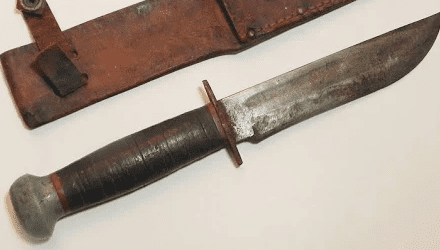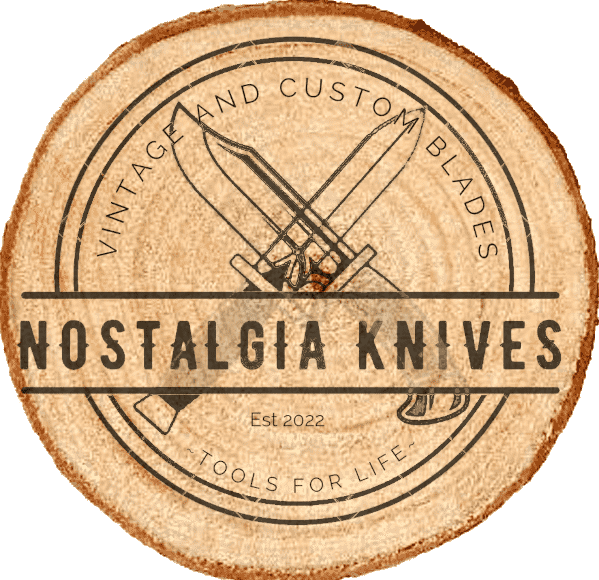Combat and Survival: Knives of the World War I and World War II era.
Posted on November 19, 2023 by congo

Combat and Survival: Knives of the World War I and World War II era.
Introduction:
World War I and World War II were tumultuous periods in human history, marked by unprecedented global conflict. In the chaos of the battlefield, the role of knives became crucial for soldiers engaged in close-quarters combat and survival situations. This chapter explores the significance of knives in the context of warfare during these two world-altering conflicts, shedding light on their design, utility, and the impact they had on the lives of soldiers.
World War I: The Trench Warfare Era
Trench Knives:
The trench warfare of World War I presented unique challenges, with soldiers often engaged in brutal hand-to-hand combat in the confined spaces of trench systems. Trench knives emerged as essential tools for survival in this environment. These knives typically featured a compact design with a double-edged blade, knuckle dusters for hand protection, and a sturdy handle for close-quarters combat. The intent was not only to provide a weapon for individual defense but also a versatile tool for various tasks in the harsh conditions of trench life.
Survival and Utility:
Beyond combat, knives played a critical role in the daily lives of soldiers. Whether used for cutting rations, opening cans, or constructing makeshift shelters, the utility of knives became evident in the practical challenges of wartime existence. Folding knives, often issued to soldiers, offered a compact and versatile solution for a range of tasks on and off the battlefield.
Impact on Design and Innovation:
The demands of World War I influenced the design and innovation of military knives. Manufacturers responded to the needs of soldiers by producing knives with reinforced blades, improved grips, and features tailored for the rigors of trench warfare. The lessons learned from this conflict would echo in the design of knives for future wars.
World War II: The Era of Specialized Blades
Combat and Utility Knives:
World War II brought about a new generation of combat and utility knives, reflecting the evolving nature of warfare. The iconic M3 Trench Knife, issued to American soldiers, featured a double-edged blade and a distinctive cross-guard, embodying the versatility required for both combat and utility purposes. Similarly, the British Fairbairn-Sykes Commando Knife became synonymous with elite forces, emphasizing precision and lethality.
Paratrooper and Survival Knives:
The airborne forces of World War II required specialized knives to meet their unique needs. Paratrooper knives, designed for easy concealment and deployment, featured folding or retractable blades. Survival knives, often issued to pilots, incorporated features like serrated edges for cutting through aircraft fuselage and survival kits for emergency situations behind enemy lines.
Bayonets and Multi-Functionality:
Bayonets continued to be a standard issue for soldiers in World War II, serving a dual purpose as both a knife and a close-quarters combat weapon when affixed to a rifle. Many bayonets of this era featured a blade with a fuller, a groove that reduced weight without sacrificing strength, showcasing the emphasis on efficiency in design.
Legacy of Combat Knives:
The combat knives of World War II left an enduring legacy in military knife design. The emphasis on functionality, durability, and versatility established benchmarks that influenced the development of military knives in subsequent conflicts and beyond. The lessons learned during this period laid the groundwork for modern combat and survival knife design.
Conclusion:
World War I and World War II witnessed the evolution of military knives as indispensable tools for soldiers engaged in the most challenging and diverse conditions. From the brutal trench warfare of World War I to the specialized needs of airborne and commando units in World War II, knives became symbols of resilience, survival, and adaptability. The design innovations and lessons learned from these conflicts continue to shape the development of military knives today, ensuring that these tools remain essential for those on the front lines of defense.
Category: Blade Talk, History & Legacy
Free Shipping on orders over $79.00
- - USA only
- - USPS Flat Rate
- - Not valid with other promotions
Make An Offer!
- - Button only visible to logged in users.
- - Unreasonable offers will be dismissed.
- - Submitting an offer is not a commitment to purchase.
- - Some items excluded from Make Offer feature.
Category Menu
- Under $109696 products
- Camp/Scout Knives3737 products
- Chef Knives33 products
- Collectible Knives335335 products
- True Nostalgia2323 products
- Damascus Knives3434 products
- Everyday Carry[EDC]427427 products
- Fixed-Blade5454 products
- Folding-Blade440440 products
- Straight-Razor11 product
- Pocket Knives397397 products
- Hunting Knives7878 products
- Money Clip Knives22 products
- Multi-Tool Knives4848 products
- Novelty Knives3737 products
- The Barrel33 products
- By Manufacturer388388 products
- Amica11 product
- Anvil Brand44 products
- AutoPoint22 products
- Bear MGC11 product
- Bear & Son Cutlery11 product
- Böker1212 products
- Böker Solingen66 products
- Boker USA33 products
- Boker Plus22 products
- Browning Knives22 products
- Buck knives22 products
- Buck Creek11 product
- CamCo33 products
- Camillus Cutlery2727 products
- Case XX™2626 products
- Cattaraugus Cutlery Co.33 products
- Cherokee11 product
- Clauss Cutlery11 product
- Colonial Knives1818 products
- Coyote Prov. USA11 product
- Ranger11 product
- Columbia River11 product
- Comanche11 product
- Craftsman55 products
- Crowing Rooster11 product
- Cuda11 product
- Custom/Handmade3232 products
- CutCo11 product
- E.C. Simmons Cutlery Co.11 product
- Elk Ridge11 product
- ESEE11 product
- F.A. Bower Imp. Co.11 product
- Federal Knife Co.33 products
- Johnston USA11 product
- Frost Cutlery1515 products
- White Tail11 product
- Steel Warrior55 products
- Frost Family11 product
- G.C. & CO Mora, Sweden11 product
- Gerber44 products
- Gerson Co. Boston11 product
- Hammer Brand66 products
- Hen & Rooster™1010 products
- HIT USA11 product
- Imperial3333 products
- iPak11 product
- IXL George Wostenholm11 product
- J.B Rand & Co.11 product
- John Primble11 product
- Johnson Western Works11 product
- Ka-Bar22 products
- Keen Kutter11 product
- Kent22 products
- Kentucky Cutlery44 products
- Eagle Edge44 products
- Kissing Crane11 product
- Klein Tools Inc.44 products
- Lark33 products
- Latama11 product
- New York Knife Co.22 products
- Old Forge Knives11 product
- Other Knives22 products
- Owl Head22 products
- PAL Cutlery Co.11 product
- Parker Cutlery Co.11 product
- PIC11 product
- Providence Cutlery66 products
- Puma33 products
- Queen Cutlery Co.11 product
- Remington22 products
- Ridge Runner11 product
- RILL Simple Tools11 product
- Rite Edge11 product
- Robeson Cutlery33 products
- Rough Rider33 products
- Royal Brand Cutlery11 product
- Sabre22 products
- Schrade3232 products
- Old Timer1717 products
- Uncle Henry66 products
- Sears55 products
- Seki22 products
- Sharp33 products
- Sheffield Knives55 products
- Simonds11 product
- SOG22 products
- Solingen Knives11 product
- Syracuse USA11 product
- Clover Brand11 product
- The Ideal1919 products
- Thornton USA11 product
- Ulster77 products
- Unknown/Misc.4343 products
- Utica Cutlery Company99 products
- Kutmaster99 products
- Valley Forge - Newark, NJ11 product
- Victorinox1010 products
- Wenger33 products
- Western22 products
- Winchester11 product
- Zippo55 products
EXCELLENT rating
Based on 1 reviews

By using this site you're accepting
our Online Sales Disclaimer
*Must Be 18 years or older to purchase*
Buyers Are Responsible For Knowledge Of And Adherence To Their Country, State and Local Knife Laws.
CA PROP 65 ⚠WARNING: Cancer and Reproductive Harm - www.P65Warnings.ca.gov
Copyright © 2025 · All Rights Reserved · NostalgiaKnives.com
Theme: Natural Lite by Organic Themes
